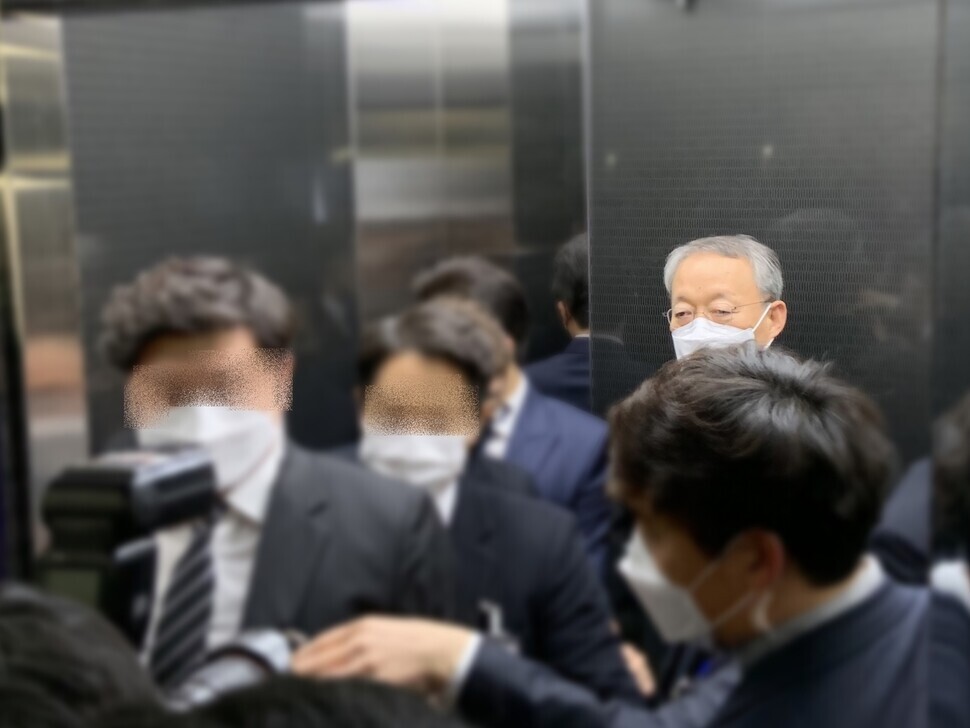hankyoreh
Links to other country sites 다른 나라 사이트 링크
[Editorial] Warrant rejection puts brakes on prosecutors’ ill-judged nuclear plant investigation

On Feb. 9, a court dismissed a request for a warrant to arrest former Minister of Trade, Industry and Energy Paik Un-gyu, who has been accused of abusing his authority in the 2018 closure of the Wolsong-1 nuclear reactor.
After indicting three Ministry of Trade, Industry and Energy (MOTIE) employees late last year for expunging related data ahead of a Board of Audit and Inspection (BAI) audit, prosecutors widened their net to include the policy decision-making process. They continued their over-the-top pursuit even as critics questioned the appropriateness of targeting the Moon Jae-in’s administration’s policy of shifting away from nuclear power for investigation. Now a court has finally put on the brakes.
In dismissing the warrant request, the court said that there were “insufficient grounds in the materials submitted for concluding that [the prosecutors] have adequately supported their charges of a criminal act” and that there was “room for debate about the criminal charges themselves.”
“The accused must be guaranteed the ability to exercise his right to self-defense in a non-detained state,” it said. It concluded not only that there was insufficient risk of flight or destruction of evidence, but also that the charges themselves were inadequately proven.
This has been a very intensive investigation, which has included searches and seizures last November on all MOTIE and Korea Hydro & Nuclear Power (KHNP) departments connected with the energy transition policy, along with large-scale raids on Paik’s home and office.
In that sense, we can only conclude that the prosecutors did a sloppy job. The court also mentioned the need for a strict interpretation and application of the law when it comes to crimes involving abuse of power.
Early on, the BAI merely referred the documents’ deletion to prosecutors as “investigation reference materials.” The investigation ended up being broadened after the People Power Party lodged accusations against Paik and 11 others, insisting that they should be “held accountable” for tampering with the economic feasibility assessment and making the decision to close the reactor ahead of schedule.
Some have suggested that the investigation reflected the wishes of Prosecutor General Yoon Seok-youl, noting how it began to gain momentum a week after Yoon’s visit to the Daejeon District Prosecutors’ Office.
Various circumstantial evidence suggests that the investigation has been political in nature. We’ve also recently seen tiresome political wrangling over a document concerning the possible construction of a nuclear power plant in North Korea, which was mentioned on the indictment of the officials who deleted the documents.
The policy decision to close Wolsong-1 was based not only on economic feasibility but also a comprehensive consideration of issues such as the reactor’s security and the public’s safety. As a measure, it followed in line with the projects of the Moon administration, which was elected in part on a pledge to pursue a transition in energy policy.
Wolsong-1 completed its design life in 2012, but was put back online three years later when the Nuclear Safety and Security Commission (NSCC) approved a 10-year extension. In 2017, residents filed suit in response, and the court ruled to cancel the extension in 2017.
The decision to close Wolsong-1 was both politically and legally legitimate. Prosecutors will have a tough time defending themselves against claims that they abused their authority in conducting such a large-scale investigation for what amounted to a fishing expedition.
By Song In-geol, Daejeon correspondent
Please direct comments or questions to [english@hani.co.kr]

Editorial・opinion
![[Column] Season 2 of special prosecutor probe may be coming to Korea soon [Column] Season 2 of special prosecutor probe may be coming to Korea soon](https://flexible.img.hani.co.kr/flexible/normal/500/300/imgdb/original/2024/0426/3317141030699447.jpg) [Column] Season 2 of special prosecutor probe may be coming to Korea soon
[Column] Season 2 of special prosecutor probe may be coming to Korea soon![[Column] Park Geun-hye déjà vu in Yoon Suk-yeol [Column] Park Geun-hye déjà vu in Yoon Suk-yeol](https://flexible.img.hani.co.kr/flexible/normal/500/300/imgdb/original/2024/0424/651713945113788.jpg) [Column] Park Geun-hye déjà vu in Yoon Suk-yeol
[Column] Park Geun-hye déjà vu in Yoon Suk-yeol- [Editorial] New weight of N. Korea’s nuclear threats makes dialogue all the more urgent
- [Guest essay] The real reason Korea’s new right wants to dub Rhee a founding father
- [Column] ‘Choson’: Is it time we start referring to N. Korea in its own terms?
- [Editorial] Japan’s rewriting of history with Korea has gone too far
- [Column] The president’s questionable capacity for dialogue
- [Column] Are chaebol firms just pizza pies for families to divvy up as they please?
- [Column] Has Korea, too, crossed the Rubicon on China?
- [Correspondent’s column] In Japan’s alliance with US, echoes of its past alliances with UK
Most viewed articles
- 1Is Japan about to snatch control of Line messenger from Korea’s Naver?
- 2‘We must say no’: Seoul defense chief on Korean, USFK involvement in hypothetical Taiwan crisis
- 3Up-and-coming Indonesian group StarBe spills what it learned during K-pop training in Seoul
- 4[News analysis] Using lure of fame, K-entertainment agency bigwigs sexually prey on young trainees
- 5[Column] Park Geun-hye déjà vu in Yoon Suk-yeol
- 6Is N. Korea threatening to test nukes in response to possible new US-led sanctions body?
- 7Division commander ordered troops to enter raging flood waters before Marine died, survivor says
- 8S. Korea “monitoring developments” after report of secret Chinese police station in Seoul
- 9Will NewJeans end up collateral damage in internal feud at K-pop juggernaut Hybe?
- 10Report reveals toxic pollution at numerous USFK bases